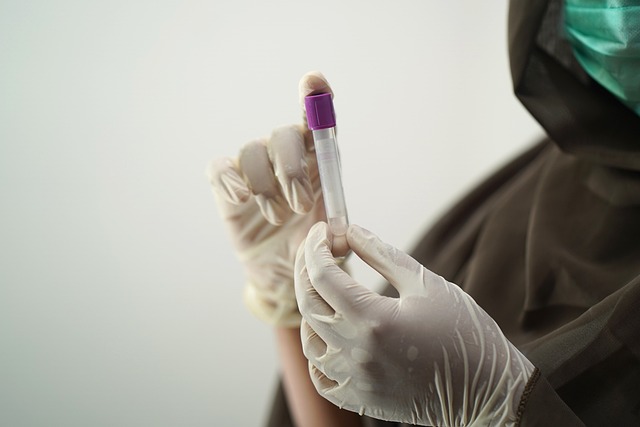The section emphasizes the critical role of the Standard Liver Blood Test in maintaining liver health as a key component of overall wellness for individuals in the UK. This home-based test is pivotal for detecting and evaluating liver function by measuring levels of bilirubin, ALT, AST, Alkaline Phosphatase, Gamma-Glutamyl Transferase, and Total Bilirubin, which can indicate liver diseases such as hepatitis or cirrhosis. The National Health Service (NHS) offers guidance on conducting these tests safely at home and integrates telehealth services to facilitate easy sharing of results with healthcare providers for professional analysis. This approach supports early detection and intervention, highlighting the test's importance in the UK's healthcare system as a diagnostic tool. Regular self-monitoring of liver health markers through the Standard Liver Blood Test UK enables proactive management and empowers individuals to identify potential liver issues early, ensuring timely medical attention when necessary for conditions affecting liver function and detoxification processes, which are essential for overall health.
Managing one’s health from the comfort of home has become increasingly prominent, with at-home health checks playing a pivotal role. This article delves into the importance of liver health monitoring, emphasizing the significance of the Standard Liver Blood Test in the UK context. We guide you through the essential components of at-home liver health monitoring, offer insights on self-administering this test, and provide strategies for integrating regular checks into your personal health management routine. Understanding your liver’s health status is key to early detection and prevention of related conditions, making informed decisions about your well-being a priority.
- Essential Components of At-Home Health Monitoring for Liver Health: The Role of a Standard Liver Blood Test in the UK
- Guide to Self-Administered Standard Liver Blood Tests: Understanding Your Results and What They Mean
- Proactive Health Management: Integrating Regular Liver Checks into Your Home Health Routine
Essential Components of At-Home Health Monitoring for Liver Health: The Role of a Standard Liver Blood Test in the UK

Maintaining liver health is a critical aspect of overall well-being, and at-home health monitoring has become increasingly important for individuals seeking to manage their health proactively. In the UK, one of the fundamental components of this self-monitoring process is the Standard Liver Blood Test. This test is pivotal in assessing liver function by measuring levels of substances such as bilirubin, alanine aminotransferase (ALT), and aspartate aminotransferase (AST) in the bloodstream. These markers can indicate potential liver issues, ranging from hepatitis to fatty liver disease or cirrhosis. For individuals at risk or those with existing liver conditions, regular monitoring of these markers can be instrumental in early detection and timely intervention. The NHS offers guidance on when and how often to undertake such tests, ensuring that individuals can perform them safely and effectively at home. With the advent of telehealth services, results can be shared with healthcare providers for professional evaluation, making the Standard Liver Blood Test a valuable tool in the early diagnosis and management of liver-related health concerns within the UK.
Guide to Self-Administered Standard Liver Blood Tests: Understanding Your Results and What They Mean

When monitoring liver health, a standard liver blood test plays a pivotal role. In the UK, this test measures key indicators such as Alanine Aminotransferase (ALT), Aspartate Aminotransferase (AST), Alkaline Phosphatase (ALP), Gamma-Glutamyl Transferase (GGT), and Total Bilirubin levels. These enzymes and substances indicate liver function, bile production, and the presence of certain conditions or blockages. For individuals interested in self-administered tests, it’s crucial to understand the normal ranges for these markers, which are often available in medical resources or through healthcare providers. Elevated levels can signify a range of issues from harmless fatty liver to more serious conditions like hepatitis or liver cirrhosis. Therefore, interpreting your results accurately requires knowledge of the reference ranges specific to the laboratory that conducted the test. If any values fall outside these ranges, it’s advisable to consult with a healthcare professional for further evaluation and guidance on next steps, which may include additional tests or lifestyle changes. Regular monitoring can aid in early detection and management of liver diseases, making self-checks an empowering tool for maintaining health. Always ensure that any blood test you undertake at home is conducted according to the standard protocols and that you have access to a certified medical facility to handle your samples and provide professional interpretation of your results.
Proactive Health Management: Integrating Regular Liver Checks into Your Home Health Routine

Regular health checks are a cornerstone of proactive health management, allowing individuals to detect and address potential issues before they escalate. A key component of this approach is integrating liver health assessments into your home health routine. The standard liver blood test UK, which measures enzyme levels, bilirubin, albumin, and globulin, among other markers, is an invaluable tool for monitoring liver function. By incorporating this test into your health regimen, you can gain insights into your liver’s condition from the comfort of your home.
For those concerned about their liver health, the standard liver blood test UK provides a comprehensive overview of liver performance and can be easily arranged through GP services or private healthcare providers. It’s a non-invasive procedure that can help in identifying early signs of conditions such as hepatitis, fatty liver disease, or cirrhosis, enabling timely medical intervention if necessary. Regular self-monitoring of this nature empowers individuals to take charge of their health and maintain optimal liver function, which is crucial for overall wellbeing given the liver’s vital role in detoxifying the body and processing nutrients from food.
Regular health checks at home, particularly for liver health, are increasingly becoming a pivotal aspect of personal healthcare management. With the advent of accessible tools and the importance of early detection, individuals in the UK can now integrate a Standard Liver Blood Test into their routine health maintenance. This article has outlined the essential components of at-home monitoring, provided a guide to self-administering these tests, and emphasized the benefits of proactive management. By understanding one’s liver health status, individuals can take informed steps towards maintaining their well-being. It is clear that incorporating such tests into home healthcare practices is not only convenient but also a critical step in safeguarding one’s health, as emphasized by the Standard Liver Blood Test UK guidelines.
